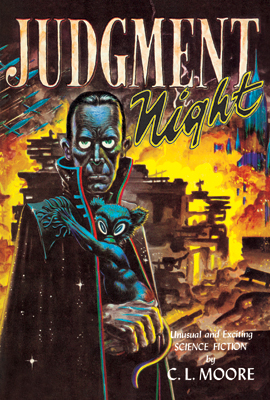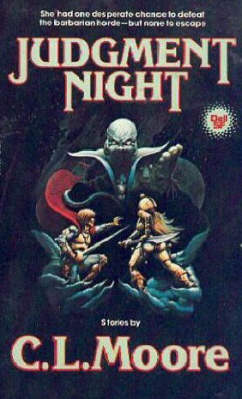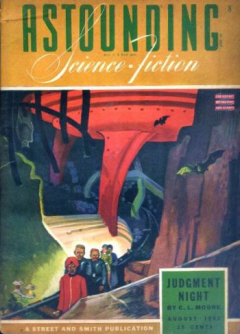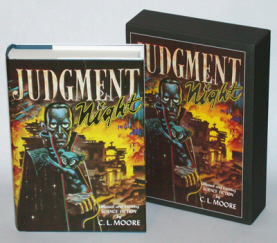Judgment Night: Space Opera and More From One of the Female Pioneers of the Genre
 Famed with her husband Henry Kuttner for turning out superlatively compelling and complex stories for the pulps, both jointly and singly, Catherine Moore began writing in 1933.
Famed with her husband Henry Kuttner for turning out superlatively compelling and complex stories for the pulps, both jointly and singly, Catherine Moore began writing in 1933.
But she had to wait nearly twenty years for any of her fine tales to achieve single-author book form, and the volume under discussion today is the long-awaited result. It contains five stories — one actually a short novel — from the pages of John W. Campbell’s Golden Age and Silver Age Astounding.
The title piece is the novel, from 1943. A primal space opera, it concerns the star empire of the Lyonese, whose central world is Ericon, where ancient patron gods live, remote from day-to-day affairs of the empire.
But now the vast holdings of the Lyonese are crumbling under the assault of a younger race, the H’vani. The Emperor’s heir is Juille, a daughter, and she’s determined her dynasty will continue. She wages a one-woman campaign against the wishes of her doddering father to save all that her ancestors built.
But she doesn’t count on falling in love with the H’vani ruler — or the machinations of Ericon’s living deities.
”Paradise Street” finds Jaime Morgan, a grizzled pioneer, failing to fit in on the changing planet he helped explore, Loki. Settlers — drudging farmers! — have followed in his wake, and are threatening to domesticate Loki. Will Morgan agree gracefully to the changes, or will he fight to preserve a dying wilderness? And can he bring himself to form an alliance with the slimy Venusian criminal named Shining Valley just to further his own selfish ends?
 In “Promised Land,” Ben Fenton is heir to a monstrous man named Torren, who broods over the world of Ganymede like a poisonous spider. Not content with reaping the current riches of the satellite via the bioengineered humans who can tolerate Ganymede’s alien environment, Torren wants to terraform the little world, even if it means killing off the Ganymedeans. Fenton is expected to go quietly along with these plans—and he would have, if he hadn’t fallen in love with a “native.”
In “Promised Land,” Ben Fenton is heir to a monstrous man named Torren, who broods over the world of Ganymede like a poisonous spider. Not content with reaping the current riches of the satellite via the bioengineered humans who can tolerate Ganymede’s alien environment, Torren wants to terraform the little world, even if it means killing off the Ganymedeans. Fenton is expected to go quietly along with these plans—and he would have, if he hadn’t fallen in love with a “native.”
For a break, we switch to a contemporary terrestrial venue, and check in on Rufus Westerfield in “The Code.” Westerfield is the first subject of an experimental procedure to restore youth to the human body. At first, the experiment seems a success. But then Rufus keeps on getting younger, and younger — and stranger too. What awaits the end of his devolution?
Finally, in “Heir Apparent,” we return to the future history of “Promised Land,” but not to the same characters. This time we view events from Earth, where Integration Teams run the colonizing program. Ed Harding has been booted from one of these Teams, and now longs to get back to the unique status and perks they offer. There’s rumors of a rogue team he could join. He only has to convince his mortal enemy to let him onboard — or kill the man before he kills Harding.
Powerful anti-heroes and a sense of melancholy unique in SF. C. L. Moore’s virtues were manifold. She had a powerful, propulsive prose style and plotting abilities. She favored doomed characters that would allow her to express her melancholy, twilit view of humanity and its affairs.
And she was no slouch when it came to genuine speculative conceits.
 Her ability to tell breakneck narratives can best be seen in “Paradise Street.” Here’s a real “Bat Durston” story (the term refers to a famed advertisement in Galaxy magazine that tarted up a western adventure to read superficially like SF). Out of all the pieces in this book, this story is the only “fake” SF, being a one-for-one transposition of a western tale of mountain-man versus settlers.
Her ability to tell breakneck narratives can best be seen in “Paradise Street.” Here’s a real “Bat Durston” story (the term refers to a famed advertisement in Galaxy magazine that tarted up a western adventure to read superficially like SF). Out of all the pieces in this book, this story is the only “fake” SF, being a one-for-one transposition of a western tale of mountain-man versus settlers.
But Moore’s slambang story-telling, her exotic touches, and her love-to-hate-him antihero compel even a veteran SF fan to keep reading, despite the shallowness of the conceits. Now, that’s a real accomplishment.
Moore’s patented melancholy moods and fatalistic denouements are nowhere more evident than in “Judgment Night.” After super-heroic deeds and sacrifices on the part of both Juille and her rival, we step up and out of their sphere and assume a godlike perspective on their struggles that completely undercuts everything.
This kind of shift takes a lot of guts from the writer. Done wrong, it could lose the reader entirely. But Moore does it right.
Such an attitude must have appealed to editor Campbell, who, as Don A. Stuart, wrote his own share of melancholy tales.
But Moore could also quite deliberately press Campbell’s other buttons. Sentences like the following could have come straight from a JWC editorial.
“Savagery isn’t always a vice, you know. There’s got to be an influx of it every so often or civilization would bog down in its own rut.”
“Man is a rational animal that can ask questions, and fail, and go on again from failure.”
“Morgan got too close to civilization and he got himself fouled with it. But it’ll wash off.”
 Like the consummate pro she was, Moore could slant for the market.
Like the consummate pro she was, Moore could slant for the market.
But that didn’t stop her from performing another chief duty of the SF writer; tossing out sharp ideas. Her thoughts on bio-engineering in “Promised Land” still ring true, and in “Heir Apparent,” we get something very close to jacking into cyberspace — in 1950.
Moore deserves to be known for much more than her famous story “Vintage Season.” And this book holds high her torch.
This milestone volume is once more available in one of the handsomest facsimile editions I’ve ever seen, from Red Jacket Press [www.redjacketpress.com].
With its rich stock, sewn bindings and lavish slipcase, it immortalizes Moore in fitting fashion.
Originally published at SF WEEKLY. Paul Di Filippo’s short fiction has been collected in The Steampunk Trilogy, Ribofunk, Fractal Paisleys, Lost Pages, and others. His blog is www.pauldifilippo.com.
[…] Ryan Harvey’s Jirel of Joiry: The Mother of Us All, Paul Di Filippo’s review of Judgment Night, and C.S.E. Cooney’s recent “Jirel, Ma […]
[…] and Paul Di Filippo recently reviewed Moore’s seminal collection Judgment Night for us here. But both books are dwarfed by this thick new volume. If you’re a fan of science fantasy, […]